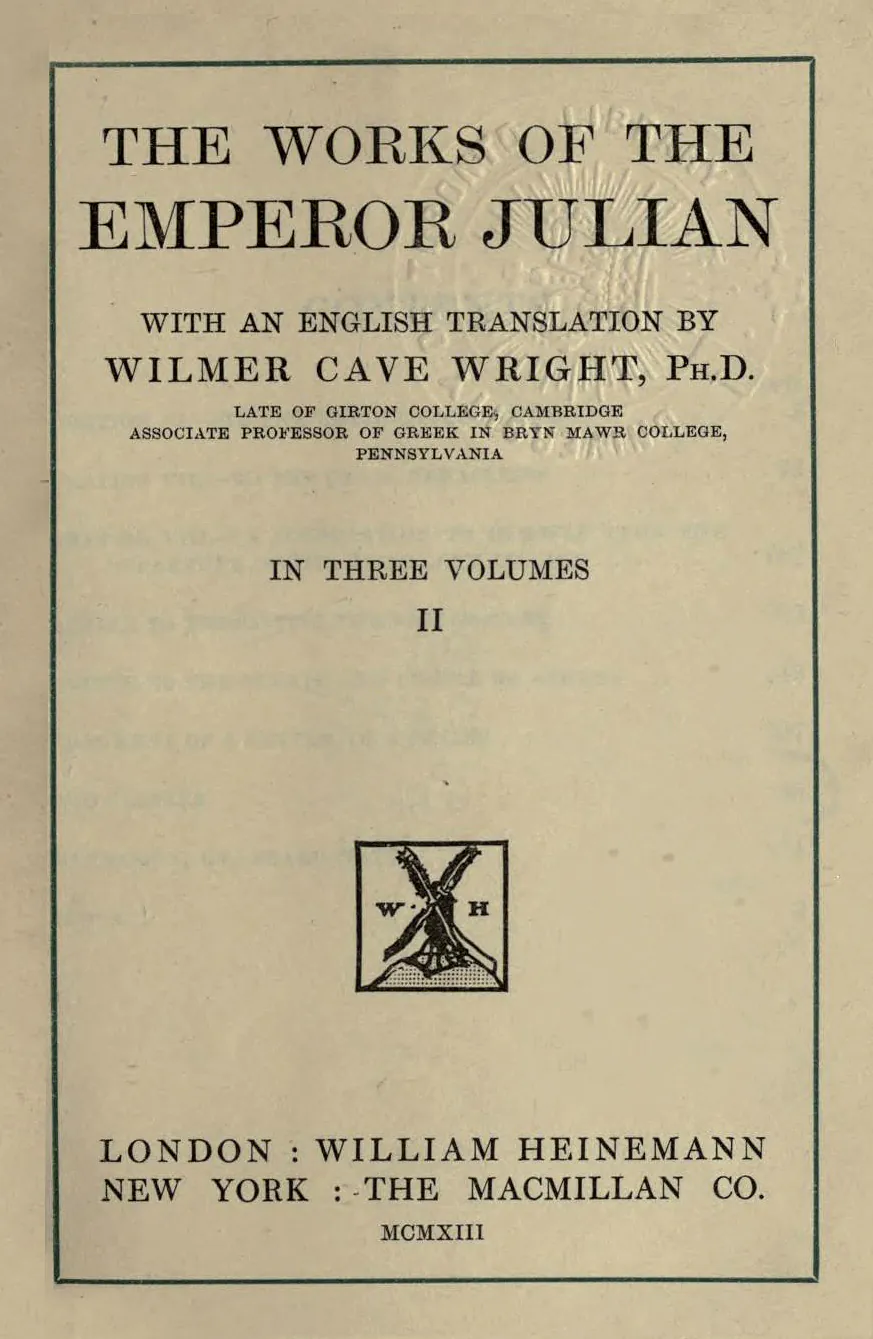[A]
μίμους, ὀρχηστάς, ἥκιστα αἰσχυνομένας γυναῖκας, παιδάρια περὶ κάλλους ἁμιλλώμενα ταῖς γυναιξίν, ἄνδρας ἀπεψιλωμένους οὔτι τὰς γνάθους μόνον, ἀλλὰ καὶ ἅπαν τὸ σῶμα, λειότεροι τῶν γυναικῶν ὅπως φαίνοιντο τοῖς ἐντυγχάνουσιν, ἑορτάς, πανηγύρεις, οὔτι μὰ Δία τὰς ἱεράς, ἐν αἷς χρὴ σωφρονεῖν· ἅλις μὲν γὰρ ἐκείνων ἐστίν, ὥσπερ τῆς δρυός,
[B]
καὶ πολὺς ὁ κόρος αὐτῶν. ἔθυσεν ὁ καῖσαρ ἐν τῷ τοῦ Διὸς ἅπαξ, εἶτα ἐν τῷ τῆς Τύχης, εἰς τὸ τῆς Δήμητρος τρὶς ἐφεξῆς ἐβάδισεν· ἐπιλέλησμαι γὰρ εἰς τὸ τῆς Δάφνης ὁσάκις εἰσῆλθον πέμενος, προδοθὲν μὲν ὀλιγωρίᾳ τῶν φυλάκων, ταῖς δὲ τῶν ἀθέων ἀνδρῶν τόλμαις ἀφανισθέν. ἡ Σύρων ἥκει νουμηνία, καὶ ὁ καῖσαρ αὖθις εἰς Φιλίου Διός· εἶτα ἡ πάγκοινος ἑορτή, καὶ ὁ καῖσαρ εἰς τὸ τῆς Τύχης ἔρχεται τέμενος.
[C]
ἐπισχὼν δὲ τὴν ἀποφράδα πάλιν ἐς Φιλίου Διὸς τὰς εὐχὰς ἀναλαμβάνει κατὰ τὰ πάτρια. καὶ τίς ἀνέξεται τοσαυτάκις εἰς ἱερὰ φοιτῶντος καίσαρος, ἐξὸν ἅπαξ ἢ δὶς ἐνοχλεῖν τοῖς θεοῖς, ἐπιτελεῖν δὲ τὰς πανηγύρεις ἐκείνας, ὁπόσαι κοιναὶ μέν εἰσι παντὶ τῷ δήμῳ καὶ ὧν ἔξεστι μετέχειν οὐ τοῖς ἐπισταμένοις μόνον θεούς,1μόνον θεούς Hertlein suggests, θεούς MSS. ἀλλὰ καὶ τοῖς ὦν2τοῖς ὧν Naber, ὧν Hertlein, MSS. ἐστιν ἡ πόλις πλήρης; ἡδονὴ δὲ πολλὴ καὶ χάριτες, ὁποίας ἄν τις εὐφραίνοιτο διηνεκῶς καρπούμενος,
[D]
ὁρῶν ὀρχουμένους ἄνδρας καὶ παιδάρια καὶ γύναια πολλά.
Ὅταν οὖν ταῦτα λογίσωμαι, μακαρίζω μὲν ὑμᾶς τῆς εὐδαιμονίας, ἐμαυτῷ δὲ οὐκ ἄχθομαι· φίλα γάρ ἐστί μοι κατά τινα θεὸν ἴσως ταῦτα. διόπερ οὐδ ̓ ἀγανακτῶ, εὖ ἴστε, τοῖς δυσχεραίνουσί μου τῷ βίῳ καὶ τῇ προαιρέσει. προστίθημι δ ̓ αὐτὸς ὅσα δυνατόν ἐστί μοι τοῖς εἰς ἐμαυτὸν σκώμμασι μειζόνως ἐπικαταχέων ἐμαυτοῦ ταυτασὶ τὰς λοιδορίας,
[A]
mimes, dancers, shameless women, boys who in their beauty emulate women, and men who have not only their jaws shaved smooth but their whole bodies too, so that those who meet them may think them smoother than women; yes and feasts too and general festivals, not, by Zeus, the sacred ones at which one is bound to behave with sobriety. No, we have had enough of those, like the oak tree in the proverb;3The phrase δρῦς καὶ πέτρα, literally, “the oak tree and the rock” became a proverb for something hackneyed; cf. Hesiod, Theogony 35, ἀλλὰ τίη μοι ταῦτα περὶ δρῦν ἢ περὶ πέτρην; we are completely surfeited with them.
[B]
The Emperor sacrificed once in the temple of Zeus, then in the temple of Fortune; he visited the temple of Demeter three times in succession.” (I have in fact forgotten how many times I entered the shrine of Daphne, which had been first abandoned owing to the carelessness of its guardians, and then destroyed by the audacious acts of godless men.4The Christians invaded the shrine of Apollo at Daphne and the priests of Apollo abandoned it to them. Julian destroyed the Christian Church there and restored the worship of Apollo.) “The Syrian New Year arrived, and again the Emperor went to the temple of Zeus the Friendly One. Then came the general festival, and the Emperor went to the shrine of Fortune.
[C]
Then, after refraining on the forbidden day,5Literally the “day not to be mentioned,” i.e. “unholy day,” nefastus dies, on which business was suspended. again he goes to the temple of Zeus the Friendly One, and offers up prayers according to the custom of our ancestors. Now who could put up with an Emperor who goes to the temples so often, when it is in his power to disturb the gods only once or twice, and to celebrate the general festivals which are for all the people in common, those in which not only men whose profession it is to have knowledge of the gods can take part, but also the people who have crowded into the city? For pleasure is here in abundance, and delights whose fruits one could only enjoy continuously;
[D]
for instance the sight of men and pretty boys dancing, and any number of charming women.”
When I take all this into account, I do indeed congratulate you on your good fortune, though I do not reproach myself. For perhaps it is some god who has made me prefer my own ways. Be assured then that I have no grievance against those who quarrel with my way of life and my choice. But I myself add, as far as I can, to the sarcasms against myself and with a more liberal hand I pour down on my own head these abusive charges.
EN translation: Wilmer Cave Wright, 1913
LEARN MORE
Place your mouse over a term to see corresponding popup from Wikipedia.
ALL PAGES

| Title | London: The Works of the Emperor Julian, Volume II/III |
| Publisher | London: William Heinemann |
| Year | 1913-23 |
| Pages | 416-511 pp. [vol. II: 538 pp.] |
| Translation | Wilmer Cave Wright. PhD |
| Editors | T.E. Page and W.H.D. Rouse |


